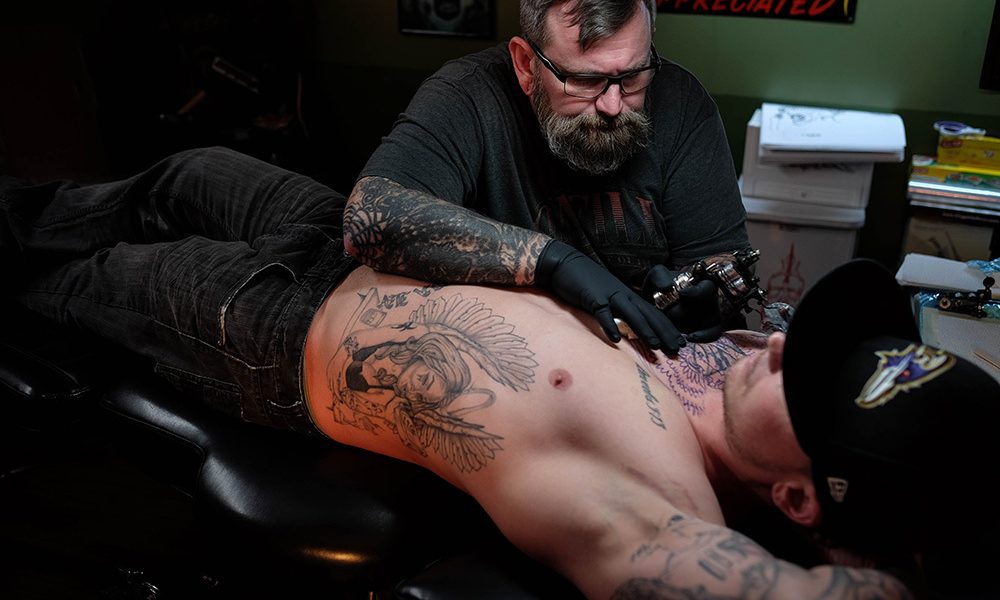News & Community
Southside Tattoo in Brooklyn Park Offers Free Cover-Ups for Racist Ink
Shop owners helps clients fulfill new outlook on life.
Buzzing tattoo guns, the sterile smell of antiseptic, and the smiling face of Beth Cutlip welcome customers through the doors of Brooklyn Park’s Southside Tattoo shop.
Southside Tattoo, once identified by the panther painted on the outside of the shop, is now making headlines for its free tattoo cover-up sessions. But these aren’t just any tattoos. This small, local tattoo shop has recently decided to provide the complimentary service to conceal racist or gang-related ink.
“I’m averaging about 75-150 messages a day of people that want free cover-ups,” explains Southside owner Dave Cutlip. “I actually have a folder of things that people have asked for that they want to pay for that way they can donate to the cause, which is cool.”
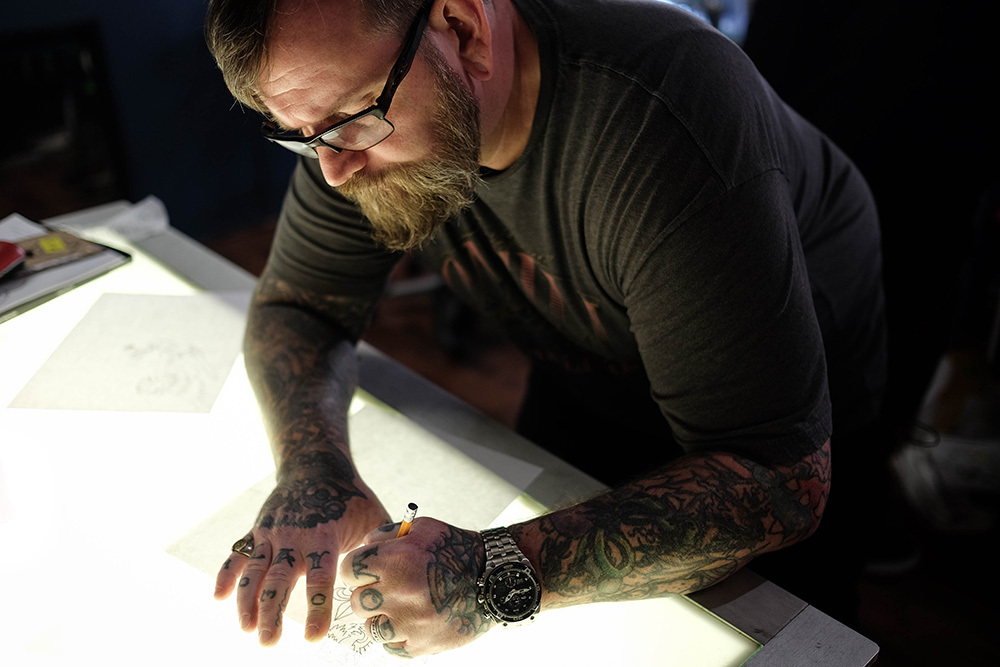
Dave and his wife, Beth, see their mission as a way to give people a second chance. It has since attracted news outlets from People magazine to Al Jazeera. But this was not always the norm for this South Baltimore tattoo shop. It all began with a single Facebook post on January 16.
“Sometimes people make bad choices, and sometimes people change. We, at Southside Tattoo would like to make a difference. If you, or someone you know has a tattoo that is GANG or RACIST related, and you want it covered… WE WILL COVER IT FOR FREE. No questions asked. We believe that there is enough hate in this world and we want to make a difference. Please call the shop and set up a consultation with any of our artist.”
The message was prompted by a man wanting to cover gang tattoos on his face. Once incarcerated and now working as an electrician, he was still encountering problems due to his tattoos, according to Beth. “He said, ‘People follow me around their house while I’m trying to fix things,’” says Beth. “I told him you can’t cover a dime with a dime. You will just have bigger facial tattoos. I’m sorry you need to go get laser removal.”
That man and his story stuck with Beth. She felt bad that she couldn’t help him, so she came up with the idea for the “Random Acts of Tattoo” project, the subsequent Facebook post, and the viral fame.
“People are making changes in their life and are still being criticized for the mistakes they made,” says Beth. “It wasn’t a marketing strategy—we wanted to give back to the community.”
But qualifying what exactly is a racist tattoo is as complicated as the issue itself.
“We aren’t covering confederate flags,” says Beth. “We did the one because it had a noose on it. Most people get those confederate flags for Southern pride.”
The selection process for the free cover-ups is a rigorous one for the Cutlips. “You would not believe how many racist tattoos are walking around America right now,” says Beth, as she pulls out a photo of a forearm with a portrait of Hitler on it. Not surprisingly, Southside sets priority for people with tattoos on their face, neck, hand, and lower arm.
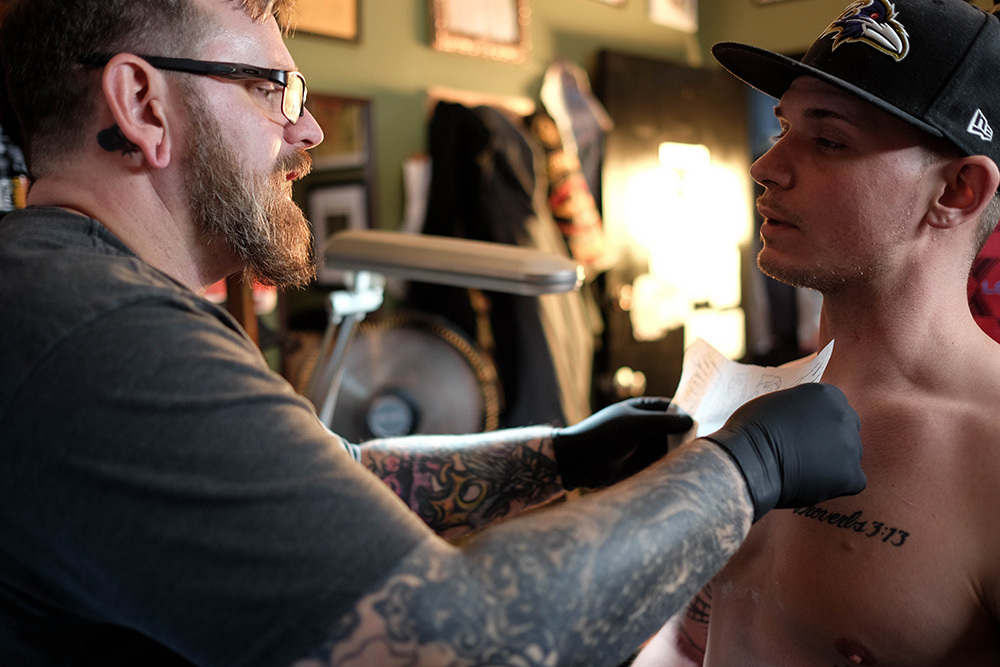
According to Dave, a typical cover-up session can run anywhere between five to seven hours for large pieces, and at $100 an hour, the service holds a hefty price tag. So the Cutlips do their research before selecting a client.
“Part of the consultation is that I talk to them to make sure they’re done with it,” says Dave. “I’m not going to cover up something just so you can go and paint ‘I hate Jews’ on something later. I’m not going to help you. I’m not going to be a part of any of that. “
Since January, the shop has been flush with business and overrun with media outlets from around the world fighting to get the inside scoop. But Dave and Beth don’t care too much about the fame. “I like to keep the focus on the people that we’re helping,” says Beth. “It needs to be about the positive improvements these people are making.”
Take Randy Sturgill, a 28-year-old Louisiana native, who was convicted of armed bank robbery almost a decade ago and was sentenced to eight years in Angola State Prison—the nation’s largest maximum-security prison. While in prison, he committed a murder that landed him in solitary confinement for 18 months. Once he got out, a particular group of people approached him.
“When I came out of the hole, the Aryan Brotherhood was like, ‘We want you on our team,’” says Sturgill about the white supremacist gang. “It’s blood in, blood out. In order to join, you have to kill. I met the quota.”
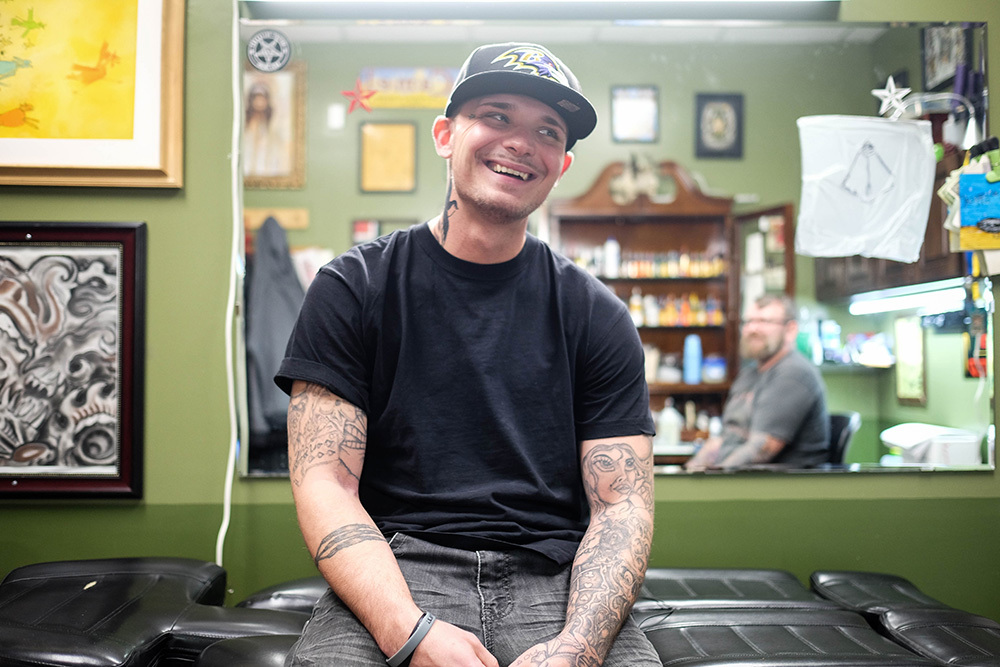
Sturgill rose high in the ranks and collected numerous tattoos as evidence. “When I got locked up, I didn’t have any tattoos,” he says. These days he’s covered in them—cobwebs on his face, full sleeves on both arms, and a host of tattoos on his torso and back. He’s lost track of his total tattoo count, but could identify that at least nine are gang-related or racist. But getting them removed is part of a larger life change.
“I quit doing drugs. I stopped selling drugs. I try not to fight anymore,” he explains. “It’s just something I had to do. And getting these tattoos covered puts a period on that chapter of my life.”
Sturgill, who lives in West Baltimore, found out about Southside Tattoo through a counselor at Health Care for the Homeless—a Baltimore-based organization working to end homelessness in the state. His counselor called Dave and shared his story.
“She said, ‘Hey I have a guy for you,’” Dave recalls. Because he was living in Baltimore now, we absolutely wanted to help him first.”
So far, Dave has already covered one of Sturgill’s gang tattoos: four stars representing his ranking in the gang down the length of his neck. The stars are no longer visible—it’s like they were never there. In their place is a bird in flight.
“It’s a sparrow,” says Sturgill. “It represents new beginnings.”
And now Sturgill is seeing Dave for his next cover-up—an iron cross surrounded by several small racist symbols (including a tiny swastika). As Dave starts sketching a stencil for the latest cover up, Sturgill explains how the tattoos never really reflected his personal beliefs.
“I’m not racist at all! I live with a black family. My godson is black,” he explains. “He’s 3 and doesn’t know what any of it means now. But I don’t want him to grow up and say, ‘Uncle Randy doesn’t like black people.’”
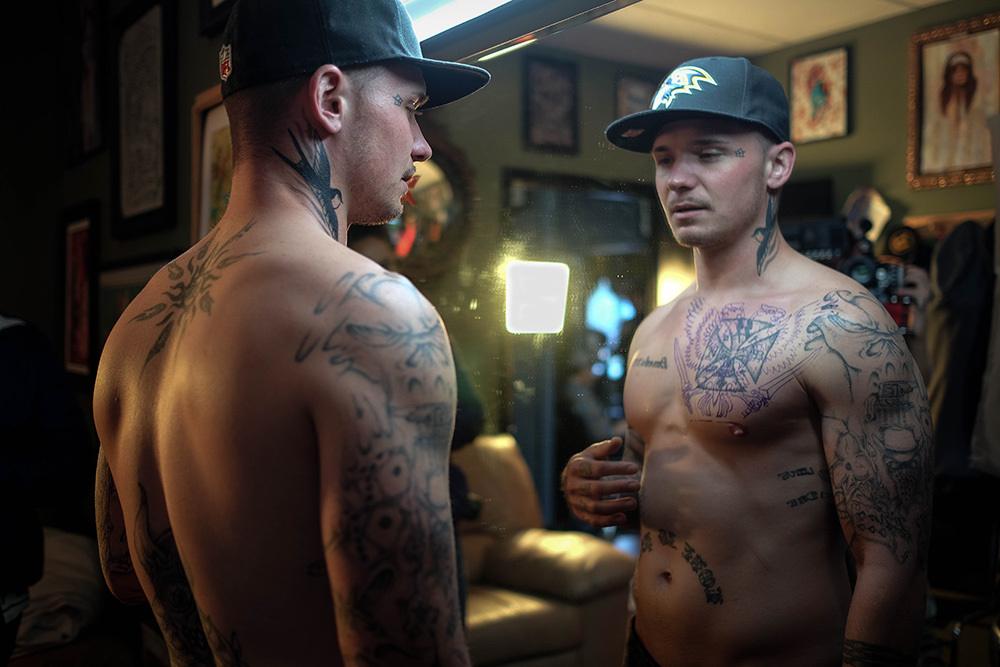
Southside’s cover-up work is quite literal—there is no laser removal but, instead, Dave shades over the existing tattoo to create something new entirely. And Sturgill has even started helping him with the work.
“What I know is from Randy,” says Dave, as he consults with Sturgill about whether a recent tattoo submission is indeed gang related. “He’s helped me out a lot, man.”
In fact, Dave has taken Sturgill with plans to make him a tattoo artist within the year.
“Dave has helped me with tattooing,” Sturgill explains. “I want to do what they do. I want to help out other people like me, like Dave and Beth are doing.”
The Cutlips have completed several cover-ups and show no signs of slowing down. The ultimate plan is to take this project across the country. Beth started a GoFundMe page to raise money for those individuals like the man that came into the shop—who started all of this—and couldn’t afford a cover-up. So far, they have raised over $14,000 with a goal of $60,000.
Amidst all the chaos of newfound fame and clients, Dave—the self-proclaimed funny guy—boils down his complex work into a really simple few words.
“It’s fun. I love tattooing,” he says. “All I ever wanted to do is help Baltimore.”
